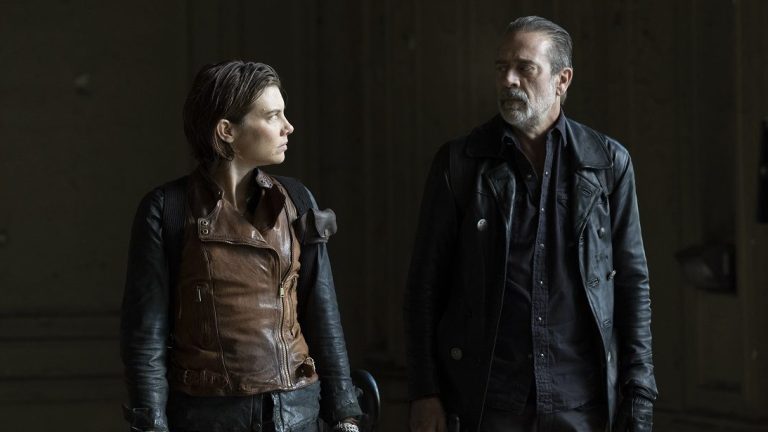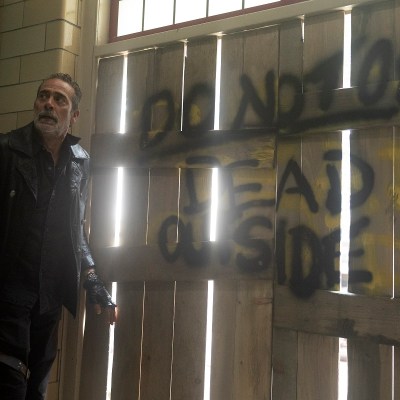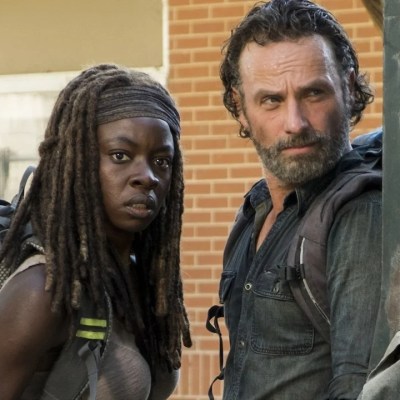The Walking Dead: Dead City Episode 6 Review – Doma Smo
The Walking Dead: Dead City comes to a close as the sins of the past make themselves felt in the present once again. You can't be the protagonist of your own story without the right enemy.

This The Walking Dead: Dead City review contains spoilers.
The Walking Dead: Dead City Episode 6
The first season of The Walking Dead: Dead City has spent a great deal of time developing some kind of bond between Negan (Jeffrey Dean Morgan) and Maggie (Lauren Cohan). It’s entirely one-sided, as this episode shows, with Negan doing everything he can to try and help Maggie get past the lingering trauma of Glenn’s death at his hand. Maggie couldn’t let it go in season 11 of The Walking Dead, and she cannot let it go now, even though Hershel (Logan Kim) is a teenager and she’s moved on from Hilltop and Alexandria. Hershel long ago let the urge to kill Negan go. Negan long ago atoned for the sins of his past (to most people he’s offended). However, Maggie can’t let it go.
Maggie isn’t Maggie Greene anymore. She’s The Widow, a character who looms almost as large in post-apocalyptic mythology as Negan himself, and unlike Negan Smith, she never had the opportunity to slip out of that character and into someone else. Even now, The Croat (Zeljko Ivanek) calls her The Widow, the one devoted to bringing down Negan and the Saviors, the one who could never forgive and forget, and all of her work spreading civilization with Georgie during Cohan’s stint on Whiskey Cavalier didn’t make a dent in that reputation. Negan, the concept, faded into mythology, and Negan Smith was glad to see him go. The Widow never did because Maggie could not or would not let go of her past.
That’s caused damage, not just to Maggie, but to Hershel as well. After the two are reunited, they have a heart-to-heart. Maggie tries to mom Hershel, but he resists, as he had been before the kidnapping. With The Dama (Lisa Emery), Hershel felt safe because he no longer had someone always looking over his shoulder, waiting for the next bad thing to happen. He was in the custody of the bad thing, such as it is, but he could finally relax a little because he didn’t have his mother’s smothering presence always on the look out for Negan or someone like him. (And yet, when that threat showed up, she was still unable to protect him.)
Maggie’s inability to let go of her trauma has pushed away both her reason for going to NYC and her potential best ally in Negan; as he reminds her, had they worked together, they could have gotten Hershel back without any need to turn Negan over to The Croat because they make, in Negan’s words, a bad-ass team. Eli Jorne makes good use of Maggie’s lingering trauma in the script; Maggie doesn’t know who she is without that pain, without that loss, so she’ll never let it go, which Negan understands, even if it’s to his own detriment. The leader of the Saviors, at the end of the day, was just a character he adopted; The Widow is Maggie because without that, she has no idea who she is, and without Negan, there is no Widow and thus, no Maggie. She’s merely the sum total of her losses, and that’s taken a toll on her relationship with everyone around her. Even now, with Hershel back, she’s got nothing to define who she is as a person.
That’s a difficult thing to get across, even with the script pushing it forward. When The Croat talks about The Widow, and about how he used her obsession with Negan to force her into cooperating with his crazy scheme to track down Negan, Cohan does a good job of selling that realization on her face. She’s been duped, she knows it, and not by someone particularly subtle. She wasn’t outsmarted in any sense of the word; everyone knows how to manipulate her and it’s using her family and her desire to hurt Negan back. No doubt The Croat isn’t the only one to push those buttons to get what they want out of Maggie.
Jeffrey Dean Morgan puts across a resigned sense of disappointment regarding his part in the proceedings, and his ultimate fate of slipping back into character, this time at the behest of forces beyond his control. It’s great work, and the scene in which Negan pushes Ginny (Mahina Napoleon) away is beautifully done, because it’s never quite clear if Negan is weaponizing the truth or just adopting the character and lying to Ginny to try to keep her out of harm’s way. Gandja Monteiro does a solid job of allowing the actors to do what they do with characters they know well, and the editing, particularly of the reaction shots of Ginny to Negan’s words, and the framing of characters in the scene, really allow the emotional impact to come through. Maybe it’s being a dad, but Negan pushing his stand-in daughter away for her own good despite the pain it clearly caused him hit me hard.
Maggie is too straightforward for her own good; see Negan, hit Negan, look for Negan again. Negan seems incapable of being honest with anyone and would rather lie to get what he wants than say his true feelings. He gets what he wants out of it, and he gets to take the easy way out. Whether that’s because Negan Smith the person can’t do what needs to be done. Perhaps this is him taking the easy way out. Perhaps this is Negan trying to get back into character because he knows that’s the only way he’s going to get out of whatever The Croat and The Dama have planned for him. Ultimately, it’s left open for debate, and it is unclear what Negan is going to do with the opportunity he’s been given.
He doesn’t seem especially thrilled to be back in the business of empire building, and it’s hard to blame him after what happened to his last empire. Like Perlie (Gaius Armstrong), he seems to be resigned to working for people he doesn’t particularly like as they head towards a war over the resources still present on Manhattan island. As a stand-alone series, the first series of Dead City is fun and offers enough new wrinkles to keep things interesting without any real resolution to anything aside from the Hershel plot.
The first season serves mostly at a place to set up the announced second season, which puts Maggie and Negan in a very familiar position, though not necessarily one of their choosing and perhaps at the behest of forces beyond their understanding. The Dama seems to be a solo operator; New Babylon seems to have some sort of backing force behind them (if you can put any faith in The Dama’s explanation of the situation). In this world, it seems the forces of “evil” might have more ability to operate honestly than the “order and tranquilty” crowd. Or, perhaps, things have gotten to the point where the perception of what behavior is evil lies solely in the eyes of the individuals being forced to pick one side or another.


